People have been writing off Bitcoin, saying it’s all gone, the hype is over, and it’s never going to come back. The truth is that the Bitcoin life cycle is cyclical, and all other cryptocurrencies follow suit.[1]
Just Google the full history of cryptocurrencies, and you see spikes that boom and bust regularly. In fact, the next surge in cryptocurrencies and blockchain is already expected in late 2024.[1]
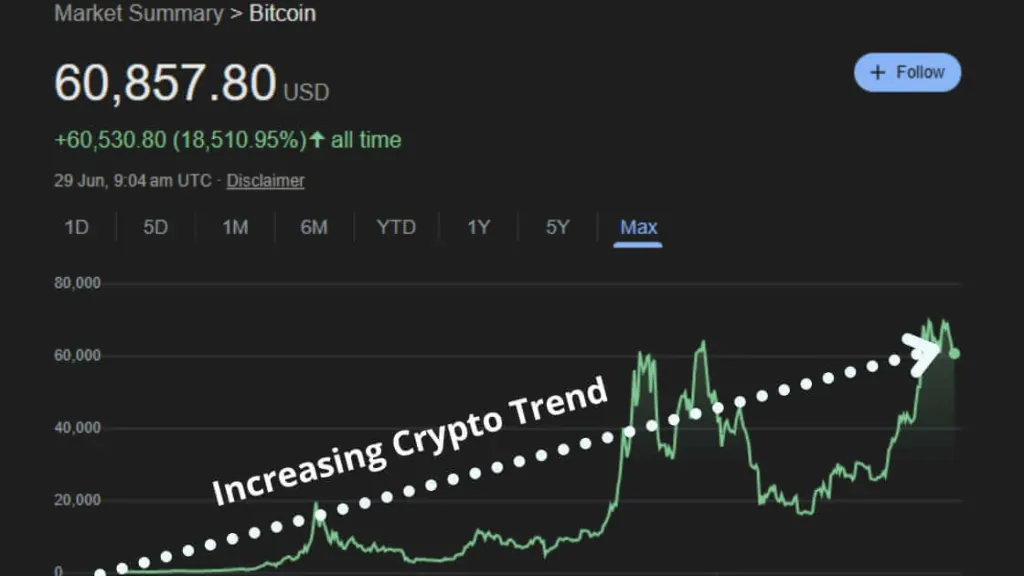
Does this interest you? Perhaps you are thinking of giving it a shot.
If yes, then you will need expert crypto SEO strategies to ensure your crypto business gets noticed in an already saturated market.
Let’s start by knowing what crypto SEO is.
What Is Crypto SEO?
Crypto SEO is your traditional SEO principles tailored to the needs of the cryptocurrency and blockchain industry. It involves optimizing your website’s content, technical aspects, and backlink profile to rank higher in search engine results pages (SERPs) for crypto-related keywords.
Why Is SEO for Crypto Important?
While paid advertising can bring initial traffic to your cryptocurrency website, it is not a long-term and sustainable solution for continued daily visits. It also comes with limitations.[2]
Here are the three reasons why SEO is important for crypto.
1. To Reach Your Targeted Audience Organically
Crypto SEO attracts users who are actively researching cryptocurrencies and blockchain technology. Statistics show search engine traffic and inound traffic converts better than other channels[3], making it a goldmine for qualified leads and daily site visits.
2. To Build Brand Awareness and Trust in the Crypto Space
High rankings on SERPs project credibility and expertise, fostering trust with potential users in a nascent industry. Crypto SEO is one of those tickets to get that reputation in the blockchain industry.
3. To Reduce Reliance on Paid Ads
Over time, a strong crypto SEO strategy can decrease dependence on expensive paid advertising, allowing you to allocate these resources to crypto affiliate marketing, website upgradation, etc.
How to Do SEO for Crypto Websites?
Now that you know why crypto SEO is important, we are here with a step-by-step guide on how does crypto SEO works.
1. Start With Keyword Research
Consider keyword research as the backbone of any successful website. So begin by identifying relevant search terms with high traffic potential but lower competition before you initiate the content creation process.
This allows you to focus your content strategy on keywords that users are actively looking for and have a high chance of ranking well without much link-building effort.
Let’s understand this via a few crypto-specific examples.
Short-Tail vs. Long-Tail Keywords in Crypto SEO
-
Short-Tail Keywords: These are broad search terms with high search volume but also high competition. They can be a good starting point for understanding general user interest. In the crypto space, examples include:
- Bitcoin
- Cryptocurrency
-
Blockchain
-
Long-Tail Keywords: These are more specific search phrases with lower search volume but also lower competition. They allow you to target users further along in their research journey. Here are some crypto-specific long-tail keywords:
- Best crypto wallets for beginners
- How to file taxes on cryptocurrency gains
- Comparison of Proof-of-Stake vs. Proof-of-Work blockchains
By identifying a mix of short-tail and long-tail keywords, you can create a well-rounded content strategy that attracts both general and niche audiences within the crypto space.
Pro-tip: Tools like SEMrush, Ubersuggest, and Ahrefs are the go-to tools for keyword research. If you don’t have experience doing this, it is a wise choice to invest in professional keyword research services.
2. Do On-page SEO to Optimize Pages and Blogposts for Crypto Keywords
Once you have your target keywords, it’s time to integrate them strategically throughout your website content. This includes:
- Title Tags
- Meta Descriptions
- High-Quality Content
- Topic Relevance
- Keyword Research
- Strategic Keyword Placement
- LSI Keywords
- Headings and Subheadings
- Image Optimization
- URL Structure
- Mobile-Friendliness (UI)
- Internal Linking
- External Linking
- Structured Data Markup (Schemas)
Also, don’t just stuff keywords; ensure they flow naturally and provide value to the reader. By using relevant keywords, you signal to search engines what your website content is about and improve the chances of your website appearing in searches related to those keywords.
All this is known as on-page SEO, and any capable SEO content writer will pull this off easily. But you don’t necessarily have to hire one—an SEO agency can produce content for you at highly feasible rates.
3. Don’t Forget Off-page SEO to Build Authority via High-quality Backlinks
Off-page SEO focuses on building your website’s authority and credibility for search engine bots. One of the most significant factors here is backlinks, which are essentially links from other websites pointing to yours.
Earning backlinks from high-quality, relevant websites in the crypto space signals to search engines that your content is valuable and trustworthy. This can significantly improve your website’s ranking potential.
Pro-tip: Guest blogging on cryto-related industry publications is a great way for link building. However, always check the Moz Domain Authority (prefer 70 and above), Ahrefs Domain Rating (prefer 40+) and spam score (should be 5% and less) of any website before considering a guest post there.
4. Take Care of Technical SEO, Too!
Technical SEO involves optimizing the underlying technical aspects of your website to ensure search engines can crawl and index your content effectively.
The following are the four areas you should focus on.
Improve Website Speed
A slow website frustrates users and hurts crypto SEO. Search engines prioritize fast-loading websites that load under 2s to deliver a positive user experience (UX). Tools like Google PageSpeed Insights can help identify areas for improvement, such as optimizing image sizes (compress and convert to WebP format via TinyPNG ), minifying code (manually or using Lightspeed Cache or similar tools), and enabling browser caching.
Here are the metrics taken directly from Google Developers Club:
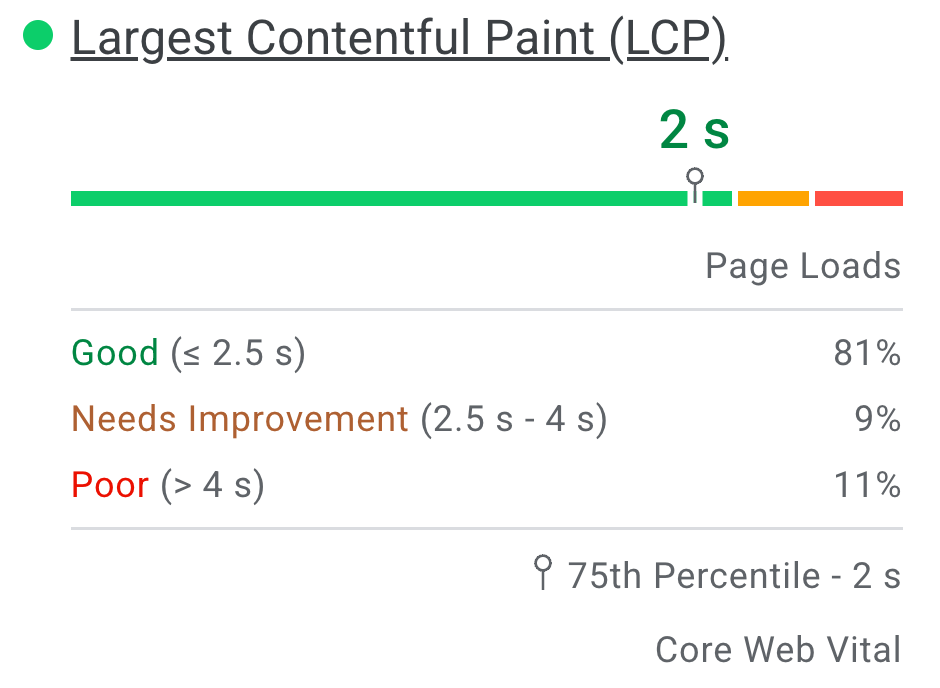
Make Your Website Mobile Friendly
With 60.67% of web traffic coming from mobile users and 92.3% of internet users preferring to browse via smartphones and tablets[4], a mobile-responsive website is no longer optional. Even Google prioritizes mobile-friendly websites in search results, so ensuring your website adapts easily to different screen sizes is crucial.
Use Logical URL Structure
Descriptive URLs with relevant keywords help search engines understand the structure and content of your website. Additionally, clear URLs are easier for users to understand and navigate.
Therefore, use descriptive URLs that incorporate relevant keywords for both SEO and user experience benefits.
Good URL Structure
-
Clear and Descriptive: For example:
- https://coinmarketcap.com/academy/article/how-to-mine-bitcoin: This URL clearly indicates it’s a guide about Bitcoin mining on the CoinMarketCap website.
-
https://www.gemini.com/cryptopedia/crypto-401k-crypto-ira-bitcoin-retirement-account: This URL for Gemini highlights it’s a page about Crypto IRAs on their platform.
- Keyword-Rich (but not stuffed): in the examples above, “bitcoin-mining-guide” and “crypto-ira” are relevant keywords used naturally.
Bad URL Structure
-
Obscure and Uninformative: Avoid cryptic URLs that don’t give users or search engines a clue about the content. For instance, “https://sometld.com/crypto-best-place-to-buy-2023-sale” offers no clear understanding of what type of cryptocurrency or what the purpose of the page is. Crypto products, services, or sales? Which is it?
- Keyword Stuffed: Don’t force keywords unnaturally into the URL. For example, “https://sometld.com/buy-bitcoin-fast-secure-investment-cryptocurrency-exchange” is keyword-stuffed and makes it difficult to read or remember.
Increase Website Security
Implement an SSL certificate to encrypt data and ensure a secure user experience. This is a positive SEO signal for search engines and a ranking factor for Google.[5]
Still, if you feel like you need something more detailed, check out this “SEO Accelerator Session on Technical SEO”—let’s demystify it together!
5. Create Dedicated Landing Pages and Keep a Focused Website Structure for Better Conversions
Landing pages are focused web pages designed to convert visitors into leads or customers. In the context of crypto SEO, creating dedicated landing pages for specific services, crypto affiliate programs, promoting new tokens, or simply educational content can be highly beneficial.
Consider the navigation panel of Plisio (screenshots below) and see for yourself how focused each page is. It’s as if every page is a separate landing page assembled together to make a website. They sell crypto-based solutions, have created a social reputation (Ahrefs Domain Rating of 72 indicates this), and have become a legitimate resource for crypto-focused informational content.
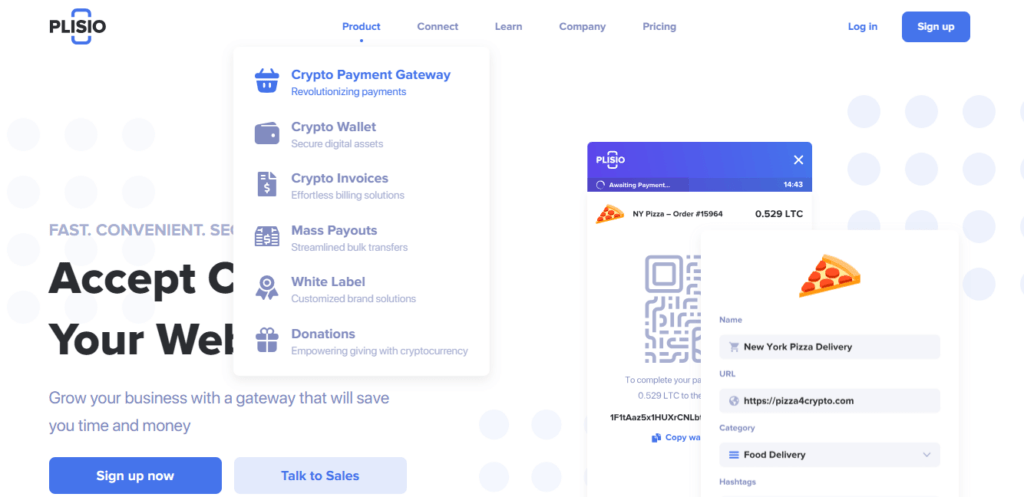
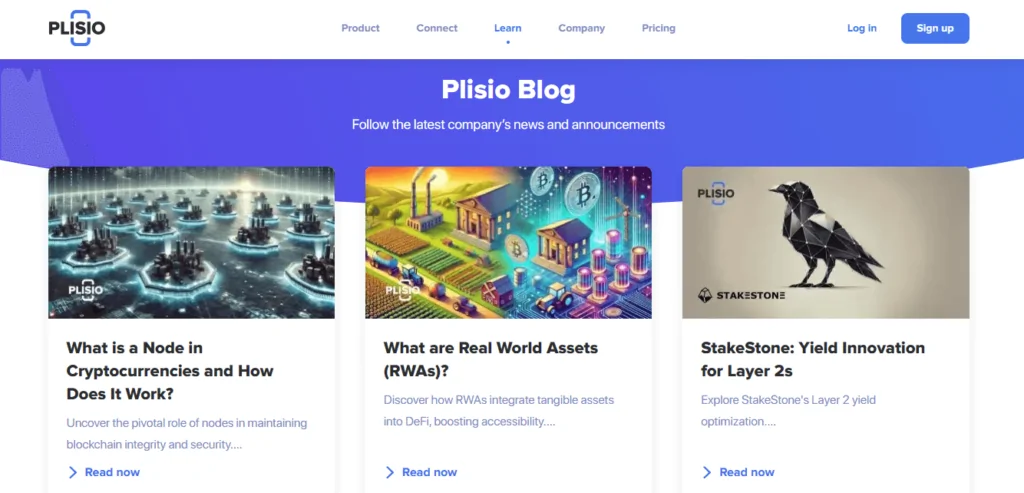
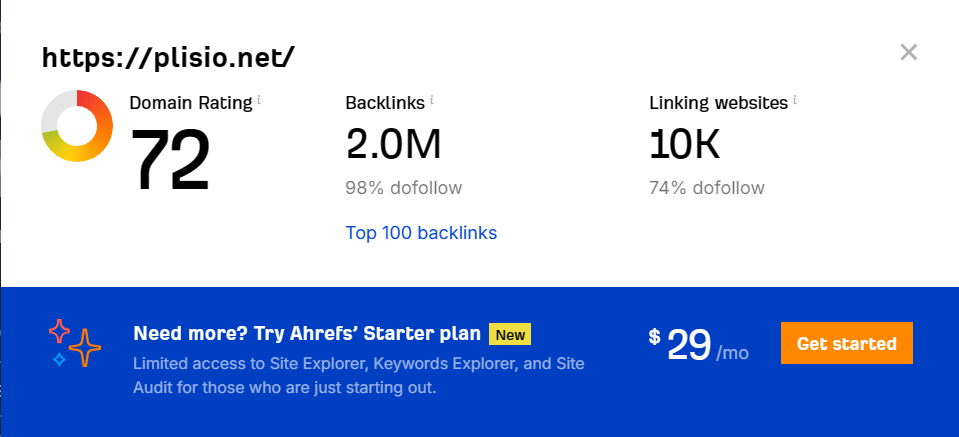
These targeted pages allow you to tailor your content and messaging to a specific audience, improving user experience and conversion rates.
Pro-tip: Use separate pages for each different section on your website, e.g., all the blog posts naturally go under the ‘blog’ section, a different ‘token promotion’ page and a landing page for ‘crypto affiliate digital products like digital wallets.’
6. Crypto Agencies, Build Authority in the Crypto Space
Establishing yourself as a thought leader in the crypto space can significantly boost your crypto SEO efforts. This involves creating high-quality, informative content not just via your website but through emails, daily posts, videos, or your own crypto podcast to demonstrate your expertise and provide value to your audience.
So, regularly publish content that addresses current blockchain industry trends and user pain points to attract daily organic traffic, build trust, and position yourself as a reliable resource.
Additionally, engage with other industry players on social media forums and conferences to further enhance your crypto agency’s brand awareness and authority.
7. Keep Monitoring Your SERP Ranking
Crypto SEO is an ongoing process, and it’s essential to track your progress and adapt your strategy over time.
- Utilize SEO tools like Semrush, Ahrefs, and Ubersuggest (the top three!) to monitor your website’s ranking for targeted keywords.
- Analyze website performance metrics like site speed, unused CSS/Javascript, and page download size to identify areas for improvement.
- Regularly review and update your content strategy based on the latest industry trends, user search behavior, and Google’s Algorithm updates.
8. Finally, Local SEO Is a Must
When you’re aiming to boost local SEO for your crypto website, start by setting up and optimizing your Google Business profile. Make sure all your info—like your address, phone number, and business hours—is spot-on.
Then, pepper your website content with local keywords that folks in your area might be searching for, like “crypto exchange in [your city]” or “bitcoin services near [your location].” Encourage satisfied customers to leave reviews ’cause those can really help your local search rankings.
Also, use structured data on your site to give search engines a clear picture of where you are and what you do. And hey, don’t forget to get involved locally! Whether it’s sponsoring events or collaborating with other businesses in your area, those connections can boost your visibility.
For example, if your crypto startup is in Miami, focus on keywords like “Miami crypto advisor” and get in touch with local crypto communities. It’s all about making sure the locals know you’re here to help with their crypto needs!
So, there you have the eight crypto SEO tips to boost ranking, increase traffic, and ensure your organic hits keep rising.
While these were all of the do’s, here comes what to avoid in crypto SEO.
What to Avoid When Doing Crypto SEO?
1. Inconsistent Blogging
Cryptocurrencies rise and fall every day, new tokens come in, and people are always curious about what is trending in the crypto market.
The question is, should you produce content daily to meet this demand? Frankly speaking, there is no thumb rule, though Neil Patel recommends 13 blogs/ month after comparing several industry giants’ blog posting posting trends.[6]
The only thing we can say is to avoid inconsistent blog posting. Don’t publish all your posts on Monday; space them out over the week. If you don’t have the budget, then even one blog every two weeks will suffice.
Just remember, skipping out on consistent blogging creates a content gap that search engines may penalize, especially if you are a crypto-news-related website.
2. Confusing Website Structure
Imagine a library with no logical organization; finding the information you need would be frustrating, right?
Likewise, a confusing website structure with poorly categorized content makes it difficult for both users and search engines to navigate and understand your content. This can lead to high bounce rates (users leaving your website quickly) and prevent your crypto SEO efforts from producing measurable results.
Hence, make your website well-structured with clear navigation for a positive user experience and good SEO.
3. Keyword Stuffing
While incorporating relevant keywords into your content is important, it’s crucial to maintain a natural flow, prioritize user experience, and follow Google’s Webmaster Guidelines that strictly penalize keyword stuffing[7].
Keyword Stuffing is the practice of excessively inserting keywords into your content in an unnatural way. Search engines can penalize websites that engage in this tactic, and readers will find keyword-stuffed content robotic and off-putting. Focus on creating informative and engaging content that naturally incorporates relevant keywords.
For example,
“Looking for the best cryptocurrency wallets for storing Bitcoin securely? Our cryptocurrency wallets guide covers everything you need to know about choosing the best cryptocurrency wallets. Find the top cryptocurrency wallets for Bitcoin, Ethereum, and other popular cryptocurrencies. Compare cryptocurrency wallets based on security features, ease of use, and compatibility with different crypto tokens. Get expert advice on setting up and using cryptocurrency wallets to keep your digital assets safe and secure. Invest in the best cryptocurrency wallets today for peace of mind!”
In this example, the keyword “cryptocurrency wallets” is repeated multiple times throughout the content.
Overusing keywords in this manner makes the text sound unnatural and overly optimized for search engines. This can lead to penalties from search engines and detract from the overall quality of the content.
4. Producing Short-Form Content Only
We know short snippets and social media posts do bring in organic social traffic to your site; search engines just don’t work this way. It is not just crypto SEO; any type of SEO success hinges on in-depth, informative content. This is why the average Google first SERP contains 1447 words.[8]
Do you know why?
Because search engines favor websites that offer comprehensive content that addresses user search queries in detail. Relying solely on short-form content may not provide enough value or information to satisfy search engine algorithms or user intent.
Pro-tip: Aim to create a healthy mix of content formats, including long-form blog posts, articles, and white papers that comprehensively explore relevant topics in the crypto space.
5. Pillarless Internal Linking
Remember when we talked about crypto link building?
Likewise, you have to link posts on your site too. This is called internal link building. It helps search engines understand the structure and hierarchy of your content and can also improve user experience by guiding them to deeper, more informative pages.
Pillar pages are comprehensive, authoritative pieces of content that act as central hubs, linking out to various subtopics and related content on your website. Failing to establish pillar pages and a strong internal linking strategy can hinder your crypto SEO efforts.
Pro-tip: Strategically link your content together to create a web of information that not only benefits users but also signals topic relevance and expertise to search engines. Want someone to execute a pillar content strategy to establish topical authority for your Crypto website? Or just need actionable advice? Our SEO experts can audit your site in 30 minutes (for free!)–no bluff, just value. Grab your crypto pillar content strategy for free! Book a 1-1 Strategy Call.
6. Single-Page Website Trap
You bought a domain, used an AI website builder, and created your first page—your only page—of your crypto website. Now, you expect this one-pager website to not just rank in SERPs but bring you real traffic and convert users—talk about expecting a tree to grow without roots.
Consider every page of your website as the backbone of your site, each bringing in a user to you. With just your homepage out there, you just can not compete with established websites with hundreds of pages for dedicated content.
Even search engines reward websites with multiple, well-optimized pages that target a range of relevant keywords and user search queries.
7. Plagiarism or Having Duplicate Content
Almost 30% of the total web content is duplicate[9]: manuals, tutorials, quotations, code snippets, and so on.
Then why doesn’t Google take action against it? The answer is that it is NOT duplicate content.
When you quote a few words or a section from a website, embed the relevant link, and send your visitors to this site for further reading, you help improve user experience. Google takes note of this improved user experience, the amount of original content you have, and the overall reputation of your website to decide whether you are answering the search intent or just plagiarizing. You are then given an appropriate page rank.
The real duplicate content that gets penalized, however, are entire blog posts copied/ pasted around the same idea (Avoid this!).
Google does two things to deal with this:
- Penalize your site or deindex the page.
- Throw all the duplicate posts somewhere on page 50 of the SERPs.
Either way, it is a losing battle, so do think twice before duplicating, or follow this quick tip.
Pro-tip: If you need to reuse some content, rewrite it substantially and add your own thoughts to ensure it’s unique and provides value to your audience. Use Siteliner to find duplicate content on your website and keep it under 30% in SEO blog writing[10].
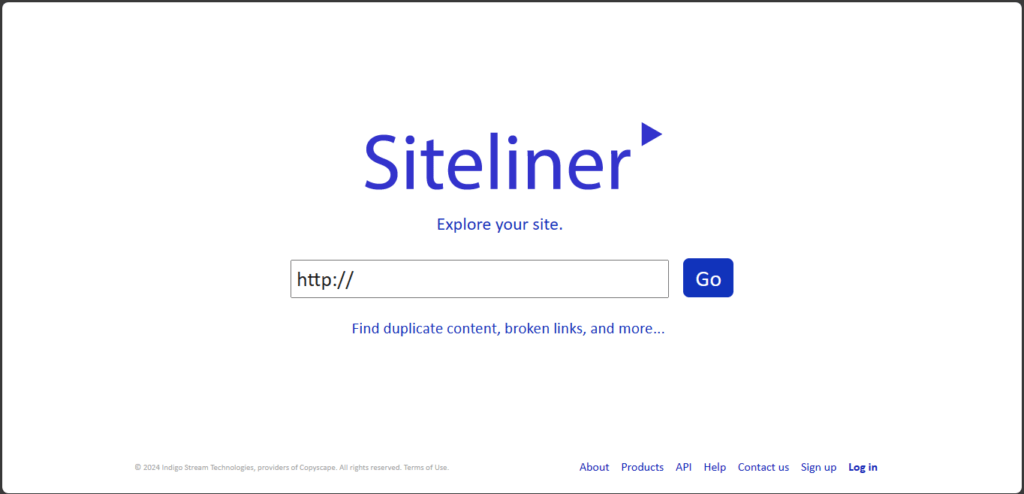
8. Ignoring Broken Links and 404 Errors
Ever clicked a website only to find a page like this one below?

How did you feel? Frustrated, annoyed, or just feeling put off? If you are anything like the millions of users out there, you probably would.
While the 404 error message above is a great design to keep the UX from going down, too many Justins—we mean, broken links on your website would degrade the search experience.
These broken links, which lead to non-existent pages (404 errors), annoy users and add friction to website navigation. Consequently, search engines have no choice but to penalize websites with a high number of broken links, as chances are the user will only end up at another one.
Pro-tip: Regularly check your website for broken links via site audits and fix them promptly to maintain a positive user experience and optimal SEO health. Ahrefs has a great broken-link checker tool.
Finally, there you have the complete expert crypto SEO tips and tricks to ensure optimal website health. How about some quick and actionable crypto SEO strategies to jumpstart your website traffic and generate income on the side?
Let’s do it.
5 Insider Crypto SEO Strategies to Quickly Boost Search Visibility and Traffic
1. New Tokens Mean Untapped and Low-competition Search Volume
New tokens, which are just new cryptocurrencies like MOCHI, Nigella, SPIKE, etc., often have a lower search volume, making them easier to rank in the beginning.
Research upcoming launches and create informative content to capture early interest. You can then send this traffic to token-related promotional campaigns and earn a commission this way.
2. Match Low-Volume Search Traffic with Good Crypto Affiliate Programs
Identify low-volume, high-intent keywords related to crypto products or services. Partner with relevant affiliate programs and create valuable content that educates users while driving targeted affiliate traffic.
For instance, Binance gives a 50% lifetime commission for every verified and qualified referral.

3. Secure Fractional Ownership of Crypto Investments via Crypto SEO
You don’t necessarily need to earn via the commercial search intent traffic only. As fractional ownership of crypto assets gains traction, you can also create content targeting users searching for information on platforms or strategies.
This can attract a niche audience with high purchase intent, and you can then try converting them.
4. Rank for Niche Products and Services When Doing Crypto SEO
Don’t compete with general crypto websites. Focus on a specific niche within the industry, like “crypto tax software or security solutions for blockchain wallets.” Target niche keywords and cater your content to a well-defined audience like:
- Crypto wallet with staking rewards
- Non-custodial wallet for DeFi
- Mobile wallet for NFTs
You can also create informational content on digital wallets, NFTs, and the general queries that the crypto audience has, but for specific crypto-related products and services.
5. Always Niche Down in Start and Target Reviews, Comparisons, and Pros & Cons
We talked about being niche-specific and targeting informational content. People are looking for different long-form content formats.
You can create reviews, comparisons, or pros & cons content targeted to a specific product or service within a niche. This allows you to rank for more relevant keywords and attract highly targeted traffic.
For instance, consider these examples for each content category.
- Targeted Reviews
Instead of a generic “Best Crypto Exchanges” review, focus on a niche like “Top Decentralized Exchanges (DEXs) for Advanced Traders” or “Best Crypto Wallets for Beginners.”
- Comparisons
Compare two (or more) closely related crypto products or services. For instance, a blockchain security company could create a “MetaMask vs. Phantom Wallet: Security and Feature Comparison for DeFi Users” guide.
See the image below. It’s a good example of a focused blog on crypto and niche products.
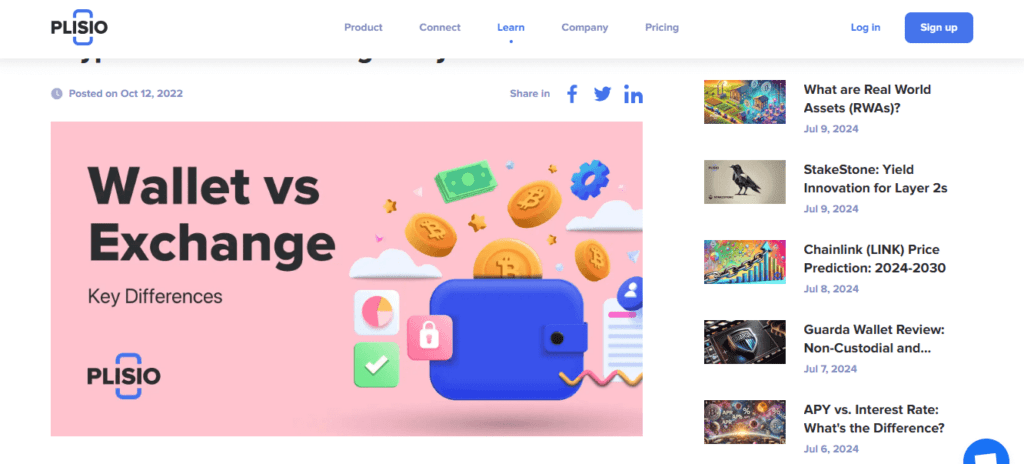
- Pros & Cons With a Niche Focus
Analyze the advantages and disadvantages of a product or service tailored to your niche audience. A crypto tax software company might write “Crypto Tax Software for Day Traders: Pros, Cons, and Must-Have Features”.
How Can a Crypto SEO Agency Help You With Cryptocurrency and Blockchain Visibility?
While you will find these expert crypto SEO strategies highly valuable, putting them into action and making them work in real-time can be a demanding task.
Also, don’t forget that cryptocurrency is still a grey area. What might work before may not work in the future. Not to mention Google’s incredibly strict restrictions on crypto and NFT advertising that regularly gets updated.[11]
Here, it is best to invest in crypto and blockchain SEO agency services to start your website with minimal risk.
We Catapult Crypto Agencies to Success
If you are considering this, then our team of crypto SEO experts at NUOPTIMA can help you develop a data-driven SEO strategy, create high-quality, informative content, build a strong backlink profile, and help you stay ahead of the curve with the latest SEO trends.
Want a crypto SEO strategy for free? Just drop us a call!
FAQ
Crypto SEO is about optimizing blockchain (Web 3.0) websites to increase site visibility, improve SERP ranking, and boost organic traffic for crypto-related keywords.
Some of the top crypto SEO keywords to optimize for are ‘best cryptocurrency,’ ‘cryptocurrency to invest,’ cryptocurrency exchange,’ and ‘cryptocurrency brokers.’
SEO for blockchain is the same as crypto SEO and aims at improving crypto-related search traffic to Web 3.0.
If it’s instant traffic you want, never hire an SEO agency for that. What you need is a paid advertising campaign to bring visitors quickly. Only consider crypto SEO services if you are looking for long-term organic traffic. You may talk to one of our SEO experts at NUOPTIMA for more information on this.
References
- Bitcoin Price Prediction 2024, 2025, 2026, 2030 (techopedia.com)[1]
- Cryptocurrency products and services | Transparency Centre (meta.com)[2]
- State of Inbound 2018[3]
- Internet Traffic from Mobile Devices Stats (2024) (whatsthebigdata.com)[4]
- Google Ranking Factors for 2024 (The 10 Most Important) (monsterinsights.com)[5]
- This Proven Blogging Frequency Works – Neil Patel[6]
- Spam Policies for Google Web Search | Google Search Central | Documentation | Google for Developers[7]
- We Analyzed 11.8 Million Google Search Results. Here’s What We Learned About SEO (backlinko.com)[8]
- Duplicate Content: Why does it happen and how to fix issues – Moz[9]
- The Truth About Duplicate Content (searchenginejournal.com)[10]
- Cryptocurrencies and related products – Advertising Policies Help (google.com)[11]



